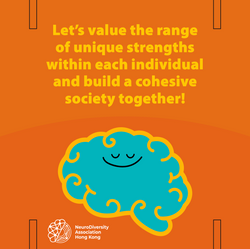 |  |  |  |  |
|---|
Psychology Framework
The neurodiversity paradigm is grounded in several psychological frameworks. These theories emphasize the inherent potential and value of all individuals, regardless of neurological differences. They focus on empowerment and value the diversive perspectives to society, aligning the core tenets of the neurodiversity paradigm.
Neurodiversity Affirming Framework
At the core of the neurodiversity-affirming framework is the fundamental recognition that neurological differences are a natural part of human variation. Rather than viewing neurological divergences as disorders or deficits, this framework celebrates them as valuable expressions of the diverse ways the human brain can function.
The neurodiversity-affirming approach directly challenges the pathologizing medical model that has traditionally dominated societal attitudes towards neurological differences like autism, ADHD, dyslexia, and others. Instead, it reframes these variations as integral components of the rich tapestry of human neurocognitive diversity.
By validating neurodiversity as a natural and positive aspect of the human experience, the neurodiversity-affirming framework provides crucial support in several key ways:
-
Acceptance and Validation: The framework promotes the validation of neurodivergent individuals, affirming their inherent worth and the legitimacy of their neurological differences. This helps combat stigma, discrimination, and the harmful notion that neurodivergence is a defect to be “fixed”.
-
Strengths-Based Approach: The neurodiversity-affirming model focuses on identifying and cultivating the unique strengths, talents, and perspectives that neurodivergent individuals possess. This empowers them to see their differences as assets rather than burdens.
-
Accommodations and Support: The framework emphasizes the importance of creating accessible and inequitable environments that provide appropriate accommodations and support to enable neurodivergent individuals to thrive. This includes modifying sensory stimuli, communication methods, and other aspects of the environment.
-
Self - Determination and Agency: Neurodiversity-affirming practices actively involve neurodivergent individuals in decisions that affect their lives, recognizing them as the experts on their own experiences, strengths and, and needs.
-
Community Building: The neurodiversity-affirming approach has a profound positive impact on society as a whole as it cultivates communities that unlock the unique talents and perspectives of neurodivergent individuals. By valuing neurological diversity, we all gain access to more vibrant communities.
Positive Psychology Framework
The neurodiversity framework shares many synergies with the positive psychology movement. Positive psychology focuses on understanding and cultivating the strengths, well-being, and flourishing of individuals and communities, rather than solely addressing deficits and pathologies.
Just as positive psychology champions a strength-based approach, the neurodiversity framework moves away from the deficit-based medical model and instead recognizes the unique capabilities and potentials of neurodivergent individuals. Both perspectives emphasize the importance of supporting individuals from a full spectrum of humankind in reaching their full potential.
Positive Psychiatry Framework
Positive psychiatric theory builds upon the principles of positive psychology, applying them specifically to the mental health field. This approach views psychiatric conditions not as disorders to be cured, but as variations in human functioning that can be supported and even leveraged.
Similarly, the neurodiversity framework challenges the pathologization of neurological differences, instead framing them as natural variations in the human neurological landscape. Just as positive psychiatric theory advocates for person-centered care that honors individuals' subjective experiences, the neurodiversity movement empowers neurodivergent individuals to be the experts on their strengths and abilities.
Both perspectives emphasize the importance of creating environments that value diverse neurological profiles, rather than pressuring individuals to conform to neuromajority norms. This aligns with the neurodiversity movement's goal of building a more equitable and cohesive society that values the spectrum of diversity in humankind.



